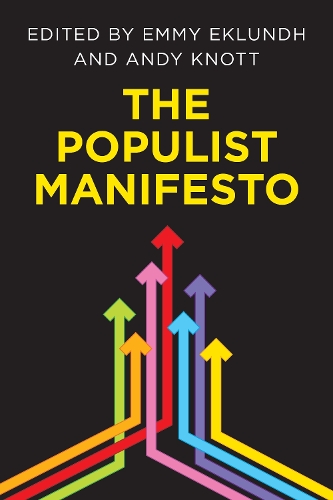
The Populist Manifesto
(Paperback)
Available Formats
Publishing Details
The Populist Manifesto
By (Author) Emmy Eklundh
Edited by Andy Knott
Bloomsbury Publishing PLC
Rowman & Littlefield International
29th January 2020
United Kingdom
Classifications
Professional and Scholarly
Non Fiction
Centrist democratic ideologies and movements
Political science and theory
Political structures / systems: democracy
320.5662
Physical Properties
Paperback
132
Width 152mm, Height 223mm, Spine 10mm
209g
Description
This volume brings together a range of scholars dissatisfied with the mainstream of the populism debate. It intends to bring forward a perspective which envisions populism not simply as a negative aspect of politics, but as a way of doing politics. Contemporary politics has been characterised by the overarching presence of populism, while simultaneously engendering a sense of fear and extremism around the results of populist movements. This collection intends to unpack the true potential for movements from and by the people, linking these historically and offering a new lens for thinking about contemporary populism. What can we learn from recent events How can these lessons inform how we think about politics for the future Offering this approach, from the perspective of populist potential, will help us answer these questions and open the debate with contributors from countries or regions that have a tradition of populism, privileging them with a deeper understanding.
Reviews
A much-needed work for the academic community and, potentially, for a broader public engaged with progressive politics. [...] Overall, the book deserves much, much attention, and, most importantly, thanks to its forceful arguments, it can serve to relaunch a wide debate amongst scholars adopting different approaches to the topic.
In The Populist Manifesto, seven scholars--Eklundh (politics, Cardiff Univ., UK) and Knott (politics and philosophy, Univ. of Brighton, UK) among them--argue that populism can be defined by its content and form. Most contemporary debate on populism centers on its current content, namely, the right-wing nationalist variant that is attached to an ethnonationalist exclusionary and nostalgic worldview. This notion engenders negative and hostile reactions from the press and academia. But populism can also be regarded as a style of politics. This style, or form, is based on engaging people through passion and emotions, and it stands in contrast to the deliberate, rational approach of mainstream politics. The authors urge progressive forces to adopt a more populist approach to politics, especially in order to solve urgent challenges related to falling wages, capital concentration, deregulation, climate change, and biological extinction. Rejecting the content of right-wing populism, adherents of this version of populism believe that a new approach to politics, one based on engaging the people, will provide a compelling alternative to neoliberal individualism, nationalism, and austerity. This is a thought-provoking book that seeks to deepen the debate on populism by encouraging contemplation of a new brand of politics. Summing Up: Highly recommended, Lower- and upper-division undergraduates and general readers.
Author Bio
Emmy Eklundh is a Lecturer in Spanish and International Politics at Kings College London. Andy Knott is Lecturer in Politics and Philosophy at the University of Brighton.
